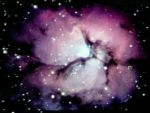|
It is not just biological evolution that poses challenges to
traditional Christian views, scientific understanding of cosmological evolution
also raises issues for people of faith. According to the Book of Genesis, God
created the universe - and all the heavenly bodies, the sun, the moon, and the
stars - in six days. But according to contemporary cosmologists the universe
began with a great explosion known as the Big Bang, after which the stars and
galaxies slowly formed over billions of years. Just as Darwin proposed that the
evolution of life was a long, slow, and gradual process, so cosmologists now
believe that our universe evolves by long slow processes.
Yet if the biblical account and the scientific account don't
match up in all their details, there are many parallels. Perhaps most
importantly, both suggest that the universe came into being out of nothing a
finite amount of time ago. Indeed, many contemporary religious believers see the
Big Bang as providing confirmation for the Christian notion of creation ex
nihilo (creation out of nothing). Interestingly, when evidence of the Big Bang
was first discovered in the late 1920's (with Edwin Hubble’s finding that the
universe was expanding), many scientists rejected the idea because they thought
it smacked of religion. If the universe had a beginning they felt, then it must
have had a creator. But that would be unscientific. At the time, the prevailing
view was that the universe had existed in much the same state forever and that
it therefore had no beginning.
 Hubble's
discovery that the universe was expanding put paid to this static vision of the
universe and suggested that the cosmos had a definite starting moment. Moreover,
this view was supported by Einstein's General Theory of Relativity, which
provided a beautiful set of equations to describe how a universe could arise out
of nothing. Ironically, the tables have now been turned with some scientists
today arguing that the Big Bang demonstrates that the universe came into being
by purely natural processes needing no supernatural power. Hubble's
discovery that the universe was expanding put paid to this static vision of the
universe and suggested that the cosmos had a definite starting moment. Moreover,
this view was supported by Einstein's General Theory of Relativity, which
provided a beautiful set of equations to describe how a universe could arise out
of nothing. Ironically, the tables have now been turned with some scientists
today arguing that the Big Bang demonstrates that the universe came into being
by purely natural processes needing no supernatural power.
This view has been expressed most famously by the English
physicist Stephen Hawking. In his best-selling book "A Brief History of
Time", Hawking suggested that if current cosmological theories turn out to
be true then the creation of the universe will have been completely explained by
the laws of physics. In that case, Hawking asks, what role would there be for a
creator?
 But
again, where Hawking sees science as writing God out of the picture, others take
a different view. Physicist Paul Davies, for example, has written that the
beauty and order of the laws of physics themselves suggests there must be
something behind those laws, something driving the mathematical beauty and order
in the universe. Likewise physicists John Polkinghorn and John Barrow believe
the incredibly finely balanced mathematical order of the universe suggests there
must be some kind of intelligent force responsible. Stephen Hawking himself has
associated God with the laws of physics. In particular, he and Davies have
associated God with a so-called "theory of everything" - a single
theory that physicists hope will one day unite general relativity with quantum
mechanics, thereby bringing the entire universe under one grand mathematical
umbrella. This theory is a major goal of contemporary theoretical physics, and
it is this which Hawking has famously linked to "the mind of God".
Perhaps more than any other science, cosmology is a case where one can either
see God reflected in the picture, or not. In the end, science neither proves nor
disproves the existence of God. More often than not, the scientific evidence can
be read either way. But
again, where Hawking sees science as writing God out of the picture, others take
a different view. Physicist Paul Davies, for example, has written that the
beauty and order of the laws of physics themselves suggests there must be
something behind those laws, something driving the mathematical beauty and order
in the universe. Likewise physicists John Polkinghorn and John Barrow believe
the incredibly finely balanced mathematical order of the universe suggests there
must be some kind of intelligent force responsible. Stephen Hawking himself has
associated God with the laws of physics. In particular, he and Davies have
associated God with a so-called "theory of everything" - a single
theory that physicists hope will one day unite general relativity with quantum
mechanics, thereby bringing the entire universe under one grand mathematical
umbrella. This theory is a major goal of contemporary theoretical physics, and
it is this which Hawking has famously linked to "the mind of God".
Perhaps more than any other science, cosmology is a case where one can either
see God reflected in the picture, or not. In the end, science neither proves nor
disproves the existence of God. More often than not, the scientific evidence can
be read either way.
Email
link | Feedback
| Contributed by: Margaret Wertheim
|